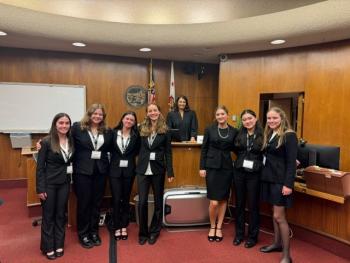In the News
News
Mar 29, 2024
Nurturing Excellence: Lessons from a High School Mock Trial Competition
Mar 29, 2024
By William Aspinwall
A new generation of legal practitioners walked into the Marin County Superior Court on a Saturday morning in early February for Marin County’s Mock Trial competition. Frenetic and youthful energy filled the courthouse hallway with excitement. Morgan Daly, a local attorney in her third year of coaching the team at Archie Williams High School, gathered her students at the end of the hall for some last-minute instruction. She reminded her students that a witness’ credibility is always fair game on cross examination. With a final refresher on the distinction between binding cases versus merely persuasive cases, she sent her team into the courtroom to argue pretrial motions. They were ready.
The Mock Trial Competition is a state-wide academic competition sponsored by MCBA and organized by the Marin County Office of Education. Student-led teams from local high schools prepare the prosecution and the defense of a mock trial (typically a murder), complete with pre-trial motions (typically on constitutional issues). The teams are coached by Marin County trial lawyers representing practice areas ranging from landlord tenant law, family law, criminal law, and everything in between. The mock trials are presided over by real judges over the course of two Saturdays in January and February. The ‘jury’ consists of local attorneys who deliberate and render a verdict as well as score the students on their performances.
Judge Sheila Lichtblau served as coordinating judge this year, taking over for Judge Paul Haakenson: “Once again, the mock trial competition was a resounding success. The students really knocked it out of the park this year. It was an honor to serve as the coordinating judge this year and I was happy to see such great participation from our judges. Kudos really goes to Michelle Drake and her colleagues at the Marin County Office of Education. They do 90% of the work to ensure mock trial runs smoothly every year.”
I observed the competition this year and was amazed to see High school students argue pretrial motions with better reasoning and clarity than some veteran advocates. The pre-trial issue involved a Fourth Amendment challenge to a geo-fence warrant. Judges interrupted the students’ prepared statements with probing questions. The interruptions challenged the students to think on their feet—a trait essential not only in litigation but also in high school, college, and beyond. These young advocates rose to the challenge - adeptly analogizing and distinguishing cases and educating the court on how the case law supported their respective positions. Their performance was a testament to the power of preparation.
During opening statements, the competitors demonstrated a mastery of courtroom advocacy beyond their years. The students adhered to courtroom norms by requesting permission from the judge to enter the well. They stood to face the jurors with confidence and poise. Their opening statements were often entirely memorized. The young advocates engaged with jurors without so much as a glance at their notes. I challenge my fellow attorneys to approach their next trials with this high level of preparation.
Joel Gumbiner, Terra Linda’s attorney coach, proudly announced that his students were, “as good as anybody who tries cases in Marin.” David Vogelstein, long-time attorney coach for Tamalpais High School, agreed. Vogelstein’s team has won 29 county championships and four state titles over the last 30 years. He coached the only California team to have won a national championship. Tamalpais mock trial competitors have gone on to clerk on the United States Supreme Court. Vogelstein’s passion for trial advocacy has rubbed off on his students. “Litigation shouldn’t be done unless it’s fun,” said Vogelstein. He encouraged his students to find joy in what they do in order to relieve the pressures of their daily lives.
As the competition continued, the students found joy in direct and cross examination. Students were tasked with laying proper foundations for their trial exhibits. They faced well-crafted objections from opposing counsel. Occasionally, the competitors were forced to abandon their pre-planned line of questioning due to a sustained objection. The students impressed with their ability to pivot to a new line of direct examination to avoid drawing further objections.
On cross-examination, these young advocates deftly controlled the narrative, confronted contradictory testimony, and impeached witnesses with precision. One Archie Williams student, Corina Karr, became the star of the show during cross examination. The witness tried to wriggle out of answering a fair line of questioning, but the student advocate held him to account through pointed leading questions.
Closing arguments were as polished as opening statements. The students had memorized their entire closing arguments without looking at any notes. It is rare to see veteran attorneys make it through a closing argument without reference to their notes. The students showed the jury their mastery of the facts and the law. They proved their dedication to their client, their passion for their case, and their belief in the righteousness of their cause.
Following the verdict, students from opposing teams voted on awards to honor their competitors. Opposing counsel voted on MVP’s after the competition. In doing so, the students recognized the skills, abilities, and contribution of the other side. Opposing counsel’s recognition of each other’s talents and preparation fostered a culture of civility and mutual respect—a tenet sorely needed in the legal profession.
The two finalists were Marin Catholic High School and Tamalpais High School. These teams faced each other in a final round, and Tamalpais emerged the victor. Tamalpais High School will go on to represent Marin County in the statewide competition, taking place in Los Angeles March 22nd and 24th, 2024.
One thing became clear as the curtains closed on Marin County’s Mock Trial Competition: the future of the legal profession is bright. High school mock trial competitions serve as crucibles where young minds explore the contours of legal advocacy. The passion, preparation, and professionalism exhibited by these young advocates should serve as a beacon of hope in an ever-evolving legal landscape. As they transition from mock trial courtrooms to real ones, we can take solace in knowing that the practice of law is in good hands with our next generation. Let us heed the lessons learned from these competitions to nurture excellence, civility, and mutual respect in the legal profession.
As a former prosecutor, William Aspinwall understands the strategies and tactics the Marin County District attorneys office employs. He uses this experience to identify and exploit weaknesses in the prosecution case in order to defend your constitutional rights. William specializes in jury trials.













